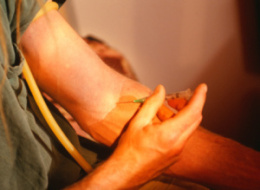 I suppose one of the perks of low self-esteem is that you are always flabbergasted when professional people read your stuff, and comment, and then BLOG about it. As my therapist aptly pointed out, my problem is not conceit. On the contrary, it’s believing–even though I did just publish two books –that I really have anything valuable to say. As I said to someone earlier today, I can never get enough affirmations because they are like ice-cubes in Haiti … they last two minutes and then I need another one to stay comfortable.
I suppose one of the perks of low self-esteem is that you are always flabbergasted when professional people read your stuff, and comment, and then BLOG about it. As my therapist aptly pointed out, my problem is not conceit. On the contrary, it’s believing–even though I did just publish two books –that I really have anything valuable to say. As I said to someone earlier today, I can never get enough affirmations because they are like ice-cubes in Haiti … they last two minutes and then I need another one to stay comfortable.
Alas, I loved the comment on my post “Competing Models? When Mental Health Recovery Clashes with 12-Step Programs” by Linda Appleman Shapiro. So I looked up her blog and was so delighted to see a very nuanced, informed, insightful post on the topic that I addressed. Linda also wrote the book “Four Rooms, Upstairs: A Psychotherapist’s Journey Into and Beyond Her Mother’s Mental Illness.” I suggest you all go visit her blog, “A Psychotherapist’s Journey.” I excerpt below a few pieces of wisdom she shares about the 12-step/mental health gap.
Returning to Borchard’s well-founded assumption that self help groups (particularly 12-Step Programs) do sometimes clash with mental health models, I think that is particularly true when ignorance abounds with regard to understanding the chemistry of the brain, for there is a very real need for some to take medication when their suffering is often a question of life or death. In such instances, none of us can afford to play God. We owe it to ourselves and to our loved ones to do our homework, to find the programs, the physicians and psychotherapists that suit the needs of those who are suffering. We must be MINDFUL and reach out to whomever we know who has walked the walk before us. If we don’t have that luxury, there is always the internet and the Yellow Pages, which list every clinic and health care provider in our areas of residence.
What we cannot afford to do is NOTHING. We cannot allow personal prejudices, feelings of embarrassment or fear to deter us from getting help for ourselves or anyone whom we care about.
Most importantly, it is the height of ignorance to believe that taking medication is a sign of weakness or that it deadens the brain or the soul. Quite the contrary. Alcoholics and those who are addicted to illicit drugs do, over time, fry their brain cells, become paranoid and worse. Psychotropic medications, on the other hand, aim to correct the faulty wiring in our brains that may be damaged, thereby improving the quality of our lives.
Whether or not someone is given a psychiatric diagnosis, and whether or not the need for medication is indicated, changes in lifestyle must occur for all those in recovery. Daily habits, the self-talk done that is destructive, the people, places and things which surrounded the addict during the times when he/she was “using” must all change. Similarly, attending 12-Step meetings can often be a life-line but it doesn’t magically rid one of his/her addiction, and while gaining spirituality is a bonus, it is not a panacea. Work has to be done in both AA and with therapists, if growth and change is to occur and if lives are to be saved.
When the clash that Borchard refers to between the goals of Recovery in 12-Step programs and the goals of Mental Health do occur, that is, in my opinion, the recipe for disaster which I referred to earlier. It is especially dangerous for those who are dual-diagnosed. If they do not feel they can freely take advantage of the best of what AA and the medical community has to offer, they will miss out on being served by the brotherhood of survivors in a 12-Step program along with the benefits of talk therapy and/or medication. When that occurs, such deprivation tells us that not enough is being done to enhance the body of knowledge in their mental health community as well as in the information disseminated among the sponsors and leaders in their self-help community.
* Click here to subscribe to Beyond Blue and click here to follow Therese on Twitter and click here to join Group Beyond Blue, a depression support group. Now stop clicking.

